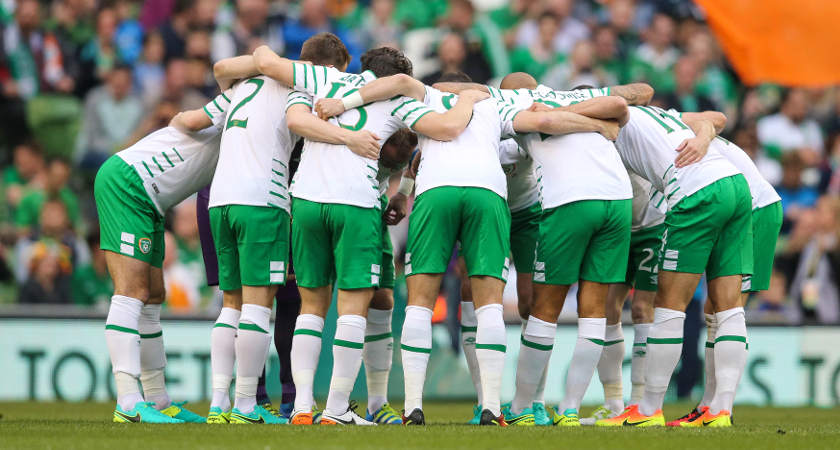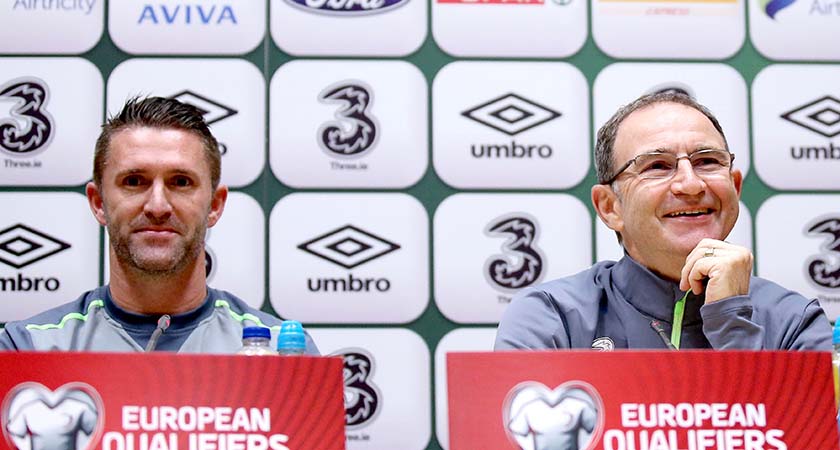ALL weekend, the chorus was repeated. Fans, dressed in green, drunk on excitement, and quite possibly something stronger, sang and sang and sang. “Come on you boys in green, come on you boys, come on you boys in green.”
Poznan became a little corner of Ireland. And then, late in the evening, they moved from the city’s square to its Municipal Stadium. Still, they sang, still they believed. And when the players appeared on the park for the warm-up, the crescendo built. Ten years had passed since they were last on a stage like this.
It was 20 years since a tournament this big took place in Europe. “You’ll never beat the Irish,” they told us. And they were right. Off the pitch, they were just so right.
What a shame a game of football had to interrupt the party.
Four years on, the memories of Ireland’s misadventure in Poland should still be fresh, although the fact that the Department of Foreign Affairs estimate that up to 70,000 Irish fans plan to travel to France for the tournament suggests that all that happened there has either been forgiven or forgotten.
Fans should travel with caution, though. Four years ago there was dreamy talk from Richard Dunne, Shay Given and Giovanni Trapattoni about a fairytale ride to the final, of ‘Ireland doing a Greece’. But 2004 wasn’t repeated. There weren’t shocks. The only surprise was that we didn’t realise quite how bad that Irish side was.
“We’ve all moved on from then,” said Given this week. “It was four years ago, remember. This is a different manager and a different group of players.”
Sensible words and you hope they get listened to. Yet after Friday’s draw with Holland, so much of the narrative reflected around the fact that the team had now lost just once in 18 months and how this kind of form could lead to big things in Paris, Bordeaux and Lille.
 The Ireland team huddle before the Holland game [Picture: ©INPHO/Gary Carr]
The Ireland team huddle before the Holland game [Picture: ©INPHO/Gary Carr]“We are very strong, every team will get a good test from us,” Richard Dunne said on the eve of the tournament. “We believe in ourselves. Our aim is to win it. That may not happen but that is why we are here.”
Depressingly they were not there for much more than a week. Three defeats changed the mood and the hangover lasted right through to September 2013, until Giovanni Trapattoni’s tenure was finally ended.
So if there is any lesson to be drawn from Poland, it is this – don’t say too much and don’t look too far ahead – words Seamus Coleman appears to have heard.
“The fact is that 2012 didn’t go too well,” said Coleman after last Friday’s win over Holland, “so we’re going to France with a completely different mindset this time. We’re a hard team to beat and we can score goals. The plan is to get out of our group and put on a far better show than we did then.
“I’m not making excuses for what happened four years ago.
“But that’s long gone. We’ve got a new manager, new coaches, new players, a mixture of freshness and experience. There is a good spirit in the team. Everyone wants to work hard for each other, we’re all putting in a shift and we all will put in that extra yard for our teammate if we see he’s tired.
“And a lot of that comes from the manager. We want to do well for him. And we want to do well for the country. We Irish are a bit different, we give it our all.
“There might be more talented players at club level but I’d rather have lads that work hard for one another. That’s why we’re doing so well.”
 Robbie Keane is one of few players left who experienced Euro 2012 [Picture: ©INPHO/James Crombie]
Robbie Keane is one of few players left who experienced Euro 2012 [Picture: ©INPHO/James Crombie]"Do I think set-pieces are important? I do,” O’Neill said after the Dutch game.
"We conceded two set pieces in our travels from the 12 qualifiers and at the start of the competition I said to the players that regardless of what happens, if we don’t concede a goal from a corner or a free kick, we will qualify".
"Now, that was a big statement to make because there was a lot of playing to do. And not every game is decided by a set piece. But they have become very important. And you have to defend them. But I don’t want to make it out that it’s all about that because you want to be able to play, too.
"I bet you Barcelona, for all their brilliance, get concerned when they concede a corner because some big lad might just come up to out-jump them and all their fantastic work has been outdone."
So in Brady and in set-pieces we have hope. And hope rather than hype is something we can live with.

